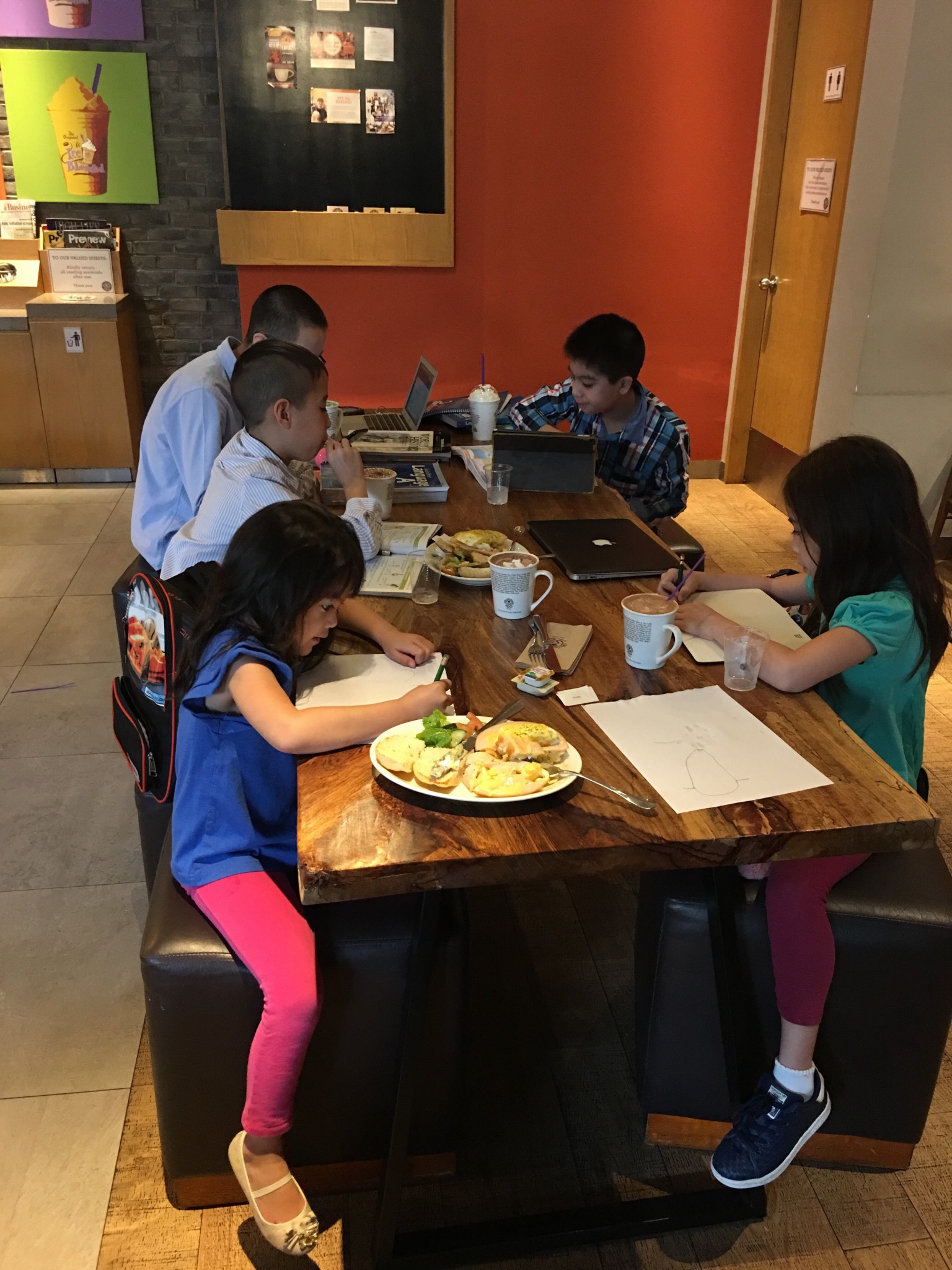 Homeschooling in the elementary age gets more and more exciting! You begin to re-learn subject matter and concepts along side your child that you stored away in the lost recesses of your mind.
Homeschooling in the elementary age gets more and more exciting! You begin to re-learn subject matter and concepts along side your child that you stored away in the lost recesses of your mind.
I have forgotten 80% of what I learned during my schooling years (yes, even if I was homeschooled for part of it). Most of the knowledge I retained as an adult had to do with the practical side of things. So, when I began to teach my eldest son, Elijah, his elementary subjects, I was like, “This is great! I’m learning all of this stuff all over again.”
Believe me, you will enjoy the teaching experience more if you don’t pressure yourself to be an expert at all the subjects. Even school teachers specialize in just one or two areas of learning, so don’t feel discouraged that you don’t know EVERY SINGLE THING that you are teaching.
You can either learn it ahead of time or learn it together with your child. During the early elementary years, the math and language arts will still be easy enough to guide your child through them without referring much to teacher’s guides. Honestly, I am very bad at following teacher’s guides! Eventually, you may have to do more preparation time as the skill levels in these subjects, especially math, escalates.
I’ve given an overview of what homeschooling my elementary kids is like so you have an idea of what to expect.
The Philippine Department of Education requires that you cover the following subject matter:
- Character and Bible (more commonly known as Good Morals and Right Conduct or GMRC)
- Math
- Language Arts or English
- Civics or Sibika (We include World History even if it is not required)
- Filipino
- Science
- Music, Art, and PE or MAPE
Schedule
A typical schedule may look like this:
7:00 AM – Wake up / Quiet Time
7:30 – Breakfast as a family
8:30 – Cover two to three subjects
10:00 – Break
10:30 – Cover two to three more subjects
12:30 – Lunch
1:30 – Rest/Independent reading
2:30 – Music practice
3:30 – Play (outdoors, ideally)
6:00 – Dinner
9:00 – Bedtime
On Thursdays, my kids have music, art, and pe classes so we skip the academics on that day which also gives me a nice break! I schedule meetings, errands, and appointments on that day. On Tuesday afternoons, we try to get together with other homeschooling families for playgroup.
I’m not very militant about my homeschooling schedule in terms of time slots for subject areas. What I do follow is starting at 8:30 am as much as possible and finishing by noon or a little bit after. On some days when it takes us the whole morning to do a project, I will forgo the other subjects. If we have an activity to attend, we won’t get to do subject studies at home, but we do car schooling. Traffic gives us ample time to cover two to three subjects. Our homeschooling is mobile, so we can also study in cafes, like this one.

To stay “on track”, I identify how many chapters or pages we should be accomplishing by the end of each quarter. Then I adjust the daily amount of work accordingly and mark off pages using sticky tabs. For example, if Tiana’s math book has four hundred pages in it, I cover one hundred pages per quarter. Then I divide each quarter into bite-sized portions. Estimating about eight weeks per quarter, this means I have to get twelve to fifteen pages done in a week for math, which translates to about two to three pages each day. To mark off these pages, I use sticky tabs and place one on every third page. My kids will work to collect that tab for the day for each subject. Sometimes, they will push themselves to go beyond just one tab. By the end of the week, they get to redeem their tabs for points or prizes. Accumulated points equate to more premium prizes.
Normally, a school year takes nine to ten months, but I target to end in eight months to leave room for trips, unprecedented activities that interrupt our schedule, and delays. So the average number of months that my kids take to complete a year ends up being somewhere between nine to ten months. I am referring to the time it takes to cover all their academic curriculum. Traveling and other activities apart from the academics are also part of my children’s learning experience.
Since my kids are enrolled under an accredited program called Homeschool Global, they meet with their academic advisors during the year for accountability. During these meetings, my kids present their portfolios (a collection of work done and usually just the highlights) to their academic advisors for evaluation and feed-backing. I get an objective assessment on my kids and tips on how to better teach them. Furthermore, my kids’ work is validated and affirmed by someone other than me, their mom. I also have to turn in their grades, a percentage of which will be given by the academic advisor after the portfolio reviews are done. Their grades are calculated based on quizzes, tests, projects, and character.
At the end of the year my kids will also be given an achievement test, the results of which give me insight into what areas I need to focus on for the next year.
The most significant change in difficulty level when teaching these years will happen between grades 3 and 4. Language and math skills take a big jump. Kids start writing in cursive, they need to do more composition and learn harder vocabulary, their tests become more comprehensive, and they move past basic arithmetic in math. I start supplementing my kids’ math instruction with Khan Academy or Prodigy at this point. These online programs help to review my kids’ foundation in math and cover any gaps I might miss or topics I can’t explain well. By this age their ability to read and comprehend on their own makes it easier for them to navigate through an online program or app.
By Grade 4 I actually start referring to answer keys and sometimes, even teacher’s guides. The other day, I had to check the answer key for Titus’ fourth grade grammar. Even though I enjoy writing, I’m not a grammar expert. Teaching the middle elementary years requires me to re-educate myself on grammar rules. Thankfully, most homeschool curriculums come with teacher’s guides and answer keys. Of course, there’s always Google, too!
At this point in your homeschooling, if you have laid a solid foundation for reading, comprehension, handwriting and composition, as well as problem solving skills, your kids won’t struggle too much with moving up the levels. Ideally, their interest in reading books will begin to take off as well. This is a great time to take them to bookstores to pick out books they would like to read. They won’t always gravitate to the classics, so start off with books that they actually want to read. For all three of my boys, this was the stage when they went from easy to read short stories to books with hundreds of pages in them. (I have to say that Elijah was the exemption. He started reading chapter books very early on.)
Please note that you will want to look for reviews of books before you buy them. I am pretty particular about the messages and content in literature that my kids handle. My older boys know how to be discerning based on agreed upon family values and convictions, but I still check on what they are reading from time to time. When Elijah was about nine years old he admitted to me that one of the books he was reading had sorcery in it that troubled him so he stopped reading it on his own. Common sense media has good reviews on books to help guide your book purchases.
You will also find your kids gravitating strongly to certain subjects and interests. Encourage these!

I remember how Edan began to develop a delight in studying Botany. Who likes Botany?! Well, he did, at around fourth grade. He studied about carnivorous plants on his own and had a mini-garden of these. Eventually, as his interest shifted, he neglected these plants. But it was a joy to see him dive into this field of science.
Homeschooling in the elementary years starts to get a little more serious but that shouldn’t remove the fun. I maintain the same perspective that I do about teaching any other level — prioritize and preserve my child ‘s love for learning and customize it for his needs. Preserve lots of time for the outdoors and free play. Most important of all, keep training in character!


Oh my gulay you mentioned Tiana’s math book! Doesn’t it give you a bad memory when you look at the page you just ripped HAHAHAHAHAHAHAHAHAHAHAHAHAHAHAHAHA
Why do you read my blog, Juancho? I noticed that most of your comments tend to be negative or trying to provoke a discussion. So I am wondering why you read my entries at all when most of your comments mock what I say. It just seems curious to me that this site interests you at all…maybe you can enlighten me…
Yeah, I told Migz [Andrada] about this and he told me that you need to monitor your site. Let’s just pray for Juancho. He needs the Lord. 🙏🏻
I’m catholic but I’m not religious. Converting to Atheist soon thanks to you, Juanchie love!
What does it mean to “convert”? If you want to be an atheist, why will you need to convert to anything? It won’t matter…
There are a lot of articles Juancho commented on. Don’t fall for it. I’ve seen his previous comments and they’re very toxic. I highly suggest you ban Juancho from this website as it he is disturbing the other readers. God bless!
Hi Ms Joy!
I’m a mother of a 1 year old daughter. I work full time as well. Following your blog has brought tremendous blessings (spiritually) in my life. It has positively influenced me as a mom and as a wife. Also with it, I found the many benefits of homeschooling our child.
However, I wonder what the preparations are, the requirements or the process I need to undergo before I can homeschool my child. I’m seriously considering this as I’m also preparing to leave the corporate world should my daughter start schooling. Are there certain qualifications required for parents who wish to homeschool their child?
Thank you for your time.
Hi. Ms. Joy! I wanted to homeschool my son but i dont think i can do it. 😔
Yes you can, Erika. What does it take to be a homeschool mom? Unconditional love for your son, a commitment to his highest good, understanding his uniqueness and learning preferences, challenging yourself to be resourceful, connecting yourself to other homeschoolers for support, walking intimately with the Lord and availing of His amazing grace! You just take it one year at a time and you learn along the way, along side your son, and through the challenges. They will be there. It’s not the easiest thing to Homeschool. It’s hard work, but it’s the kind of hard work that is worth it!!!
This is so so helpful Ms. Joy. I am gathering all information I could get to prepare myself for homeschooling, most probably by next year. This is very detailed. You make it look so easy even if we all know it’s not, it encourages me so much. Thank you thank you!!!
Hi Ms. Joy,
Just keep it up. Many people enjoy reading your blog. Don’t let people like Juancho get to you. Thanks for the inspiration you always send to your readers. God bless